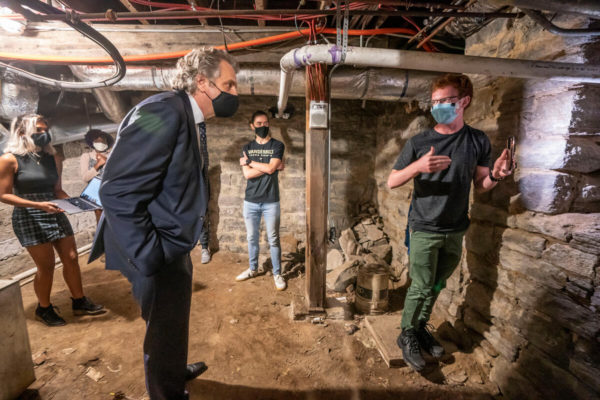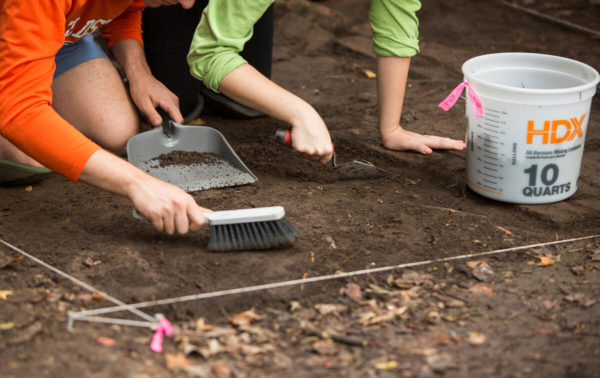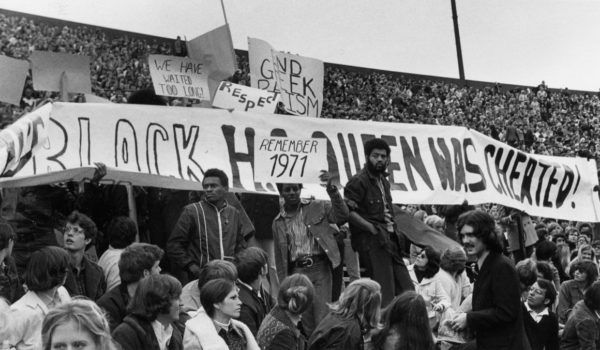On a bright fall morning, a small group of students gathered in the front room of one of the original homes on Vanderbilt’s campus. The space, dating from 1875, had once been packed with thousands of books collected by Professor William Vaughn, the university’s original librarian and one of its earliest faculty members.
Now, many generations later, students—focused on maintaining appropriate physical distance and securing their masks amid a historic pandemic—headed to the home’s dirt-floor cellar to dig for clues and an understanding of the school’s past.
It’s all part of a series of trans-institutional courses designed through the Robert Penn Warren Center for the Humanities that uses Vanderbilt’s campus as a kind of living lab, giving future historians, architects, archaeologists, curators and engineers unique hands-on experiences.

“Where else are you going to get students doing archaeological digs and delving into historical archives and curating museum exhibits and doing land-use design projects?” asks Holly Tucker, the Mellon Foundation Chair in the Humanities and director of the Robert Penn Warren Center. Tucker led the development of a proposal that earned a highly competitive grant from the National Endowment for the Humanities, which is partially funding this series.
Trans-institutional discovery
Architect and historian Matthew Worsnick’s and archaeologist and historical anthropologist Steve Wernke’s classes use the Vaughn Home and the land surrounding it to investigate multiple aspects of the site. One student in the class even uncovered clues to show that it was originally two separate buildings, suggesting the existence of previously unknown servants’ quarters.

“Because we were all physically meeting in the Vaughn Home, other than one virtual student whom we carried with us on a laptop, we were able to immediately examine where there were two thicknesses of walls connecting a main living space and a space that was originally for servants,” Worsnick says. “By combining structural information with historical information, we found where and when the home was integrated.”
Discoveries like these show a bigger picture about the people who lived in the Vaughn Home, especially the untold history of the servants there.
Students also conducted archival research under the guidance of Professor Wernke and anthropology graduate student Jennifer Foley (MA’08, PhD’17) in the Archaeological Excavation course. As Wernke relates, “In that process, Foley identified staff of the Vaughn family in U.S. Census records—two first-generation, post-emancipation African American women, who are otherwise absent in the historical record.”
Wernke and undergraduate and graduate students are currently analyzing the excavated material in this semester’s Digital Archaeology course.
History in their own words
One of the foundational courses in the series examines the history of the United States, from the post–Civil War era to the modern day, through the lens of the American research university, using Vanderbilt as a case study. The course comes alive when students get a chance to work in the University Archives and Special Collections. The materials pulled by archivists, and the projects created through the various classes, ultimately will populate a digital archive at the library as well as potential exhibits on campus.
The class first looks at literary and artistic works in each era, then explores Vanderbilt archival material, such as faculty and student correspondence, newspapers, yearbooks, student-led publications, administrative records and personal papers, to examine historical changes. This creates an opportunity to see events and decisions through a more personal lens.
“Examining this archival material in the context of the struggles of the 20th century—tied to race, ethnicity, gender, economic inequality and war—allows us to see the impact behind certain decisions and how institutions like Vanderbilt are intersecting with the larger historical narratives,” says Christopher Loss, associate professor of public policy, higher education and history.

Briana Finocchiaro, a human and organizational development major from Delray Beach, Florida, worked on a group project about the Black Power movement on Vanderbilt’s campus during the 1970s. “It’s been so inspiring to relive what students my age were feeling during very different and often difficult times,” Finocchiaro says.
First-year economics major Lyndon Shi from Memphis, Tennessee, says he was struck most by the uphill battle for women’s rights in the U.S. and on Vanderbilt’s campus over the past century.
“When you really dig into the archives, you can see almost a foreshadowing of women’s rights,” Shi says. “Maybe the progressions seemed smaller when they were actually happening, but we get to see the whole overarching change.”
New landscape
While each of the classes is creating historical records, exhibits and reports to help tell the fuller Vanderbilt story, one interdisciplinary class in the series will change the landscape of the university itself.
Civil and environmental engineering professor Lori Troxel, who is an expert in human-centered design, is leading a sustainable development class in partnership with the FutureVU Land Use Planning Initiative. The goal is to create a public space on the Vaughn Terrace, which sits squarely between the engineering school’s Featheringill Hall and the Vaughn Home.
“I’m excited about helping students design an inclusive, sustainable, environmentally friendly community space that takes in the history of both the Vaughn Home and Featheringill and has the potential to create greater interaction between the sciences and the humanities,” Troxel says.
Active historians
One of the goals of this humanities series is to make students active historians and hands-on participants in research and discovery, so they can learn more about Vanderbilt and see the intrinsic value in investigating all aspects of history and culture over time.
“Using Vanderbilt’s own history allows students to be at a granular level of how and why decisions may have been made and how those choices play out in everyday people’s lives up to today,” says Elizabeth Meadows, senior lecturer in English and associate director of the Robert Penn Warren Center.
“And someday,” she says, “decades or centuries from now, people will look back at the in-depth and personal work done in these classes to better understand Vanderbilt and our world.”
- Learn more about the classes, events and researchers connected with the Robert Penn Warren Center for the Humanities.
- Explore more of the University Archives and Special Collections.
- Read more about the FutureVU land use planning initiative.




